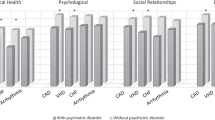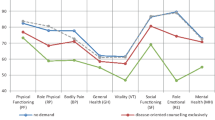Abstract
Objective: To identify the predictive factors of mental disorders in patients with suspected Ischaemic Cardiopathy (IC). Method: The patients admitted to the Cardiology Service of an University Hospital (SW Spain) for acute thoracic pain with suspected IC were studied. Patients were classified into four diagnostic groups (acute myocardial infarction, unstable angina, non-ischaemic cardiological process, non-cardiological) based on clinical, electrocardiographical and biochemical data. The sociodemographic and clinical variables were obtained by a ‘ad hoc’ questionnaire and the clinical records of the patient. The GHQ-28 questionnaire was used to assess the status of mental health, and a score of ≥6 was taken as the cut-off point for being a ‘probable psychiatric case’. Crude odds ratios (OR ± 95% CI), and adjusted OR according to a logistic model, were calculated in order to study the variables associated with the mental disorders. The tabulation and analysis of data was carried out with the SPSS v.8 (for Windows) program. Results: From June 1996 to November 1997, 185 patients were studied; 72% were males and the mean age was 60.2 years (SD = 10.4). 49.2% of the patients were scored at ≥6 on the GHQ-28, and the sub-scale accounting for the highest scores was that of somatic symptoms of psychological origin. The adjusted ORs showed that female sex (OR: 2.5; 95% CI: 1.2–5.0), previous personal history of IC (OR: 2.3; 95% CI: 1.1–4.4), and the presence of arterial hypertension (OR: 2.0; 95% CI: 1.1–3.9), were the predictive variables for being a ‘probable psychiatric case’, whereas neither age nor comorbidity were predictive. Conclusions: The percentage of subjects considered to be a ‘probable psychiatric case’ among patients with suspected ischaemic cardiopathy was high. Screening for mental disorders and intervention to control the risk factors associated are measures recommended in these patients.
Similar content being viewed by others
References
Milani RV, Lavie CJ, Cassidy MM. Effects of cardiac rehabilitation and exercise training programs on depression in patients after major coronaryevents. Am Heart J 1996; 132: 726–732.
Smith DF, Sterndorff B, Ropcke G, Gustavsen EM, Hansen JK. Prevalence and severityof anxiety, depression and Type A behaviors in angina pectoris. Scand J Psychol 1996; 37: 249–258.
Spertus JA, McDonell M, Woodman CL, Fihn SD. Association between depression and worse disease speci fic functional status in outpatients with coronary arterydisease. Am Heart J 2000; 140: 105–110.
Musselman DL, Dwight LE, Nemero. CHB. The relationship of depression to cardiovascular disease. Arch Gen Psychiatr 1998; 55: 580–592.
Ariyo AA, Haan M, Tangen CM, et al. Depressive symptoms and risks of coronary heart disease and mortalityin elderly Americans. Circulation 2000; 102: 1773–1779.
Kubzansky LD, Kawachi I, Spiro A III, Weiss ST, Vokonas PS, Sparrow D. Is worrying bad for your heart? A prospective studyof worry and coronary heart disease in the Normative Ageing Study. Circulation 1997; 95: 818–824.
Lustman PJ, Griffith LS, Clouse RE. Depression in adults with diabetes. Sem Clin Neuropsychiat 1997; 2: 15–23.
Suarez EC. Relations of trait depression and anxiety to low lipid and lipid concentrations in healthy young adult women. Psychosom Med 1999; 61: 273–279.
Ciechanowski PS, Katon WJ, Russo JE. Depression and diabetes: Impact of depressive symptoms on adherence, function and costs. Arch Intern Med 2000; 160: 3278–3285.
Wardle J, Rogers P, Judd P, et al. Randomized trial of the effects of cholesterol-lowering dietarytreatment on psychological function. Am J Med 2000; 108: 547–553.
Sherbourne CD, Wells K, Meredith L, Jackson C, Camp P. Comorbid anxietydisorder and the functioning and well-being of chronically ill patients of general medical providers. Arch Gen Psychiatr 1996; 53: 889–895.
Grupo de Trabajo de la Sociedad Española de Epidemiología. La medición de la clase social en ciencias de la salud. Barcelona: SG editors; 1995.
Goldberg D, Hillier VF. A scaled version of the General Health Questinnaire. Psychol Med 1979; 9: 139–145.
Lobo A, Perez MJ, Artal J. Validity of the scaled version of the General Health Questionnaire (GHQ-28) in a Spanish population. Psychol Med 1986; 16: 135–140.
Vazquez-Barquero JL, Ochoteco A, Padierna JA, Antón JA, Arenal A, Peña C. El cuestionario de salud general (GHQ) como instrumento de ‘screening’ de patología psiquiátrica en enfermos cardiológico. Actas Luso-Esp Neurol Psiquiatr 1982; 10: 21–32.
Badía J, Salamero M, Alonso J, Ollé A. La medida de la salud. Guía de escalas de medición en español. Barcelona: PPU, 1996.
Denollet J, Vaes J, Brutsaert DL. Inadequate response to treatment in coronary heart disease: Adverse effects of type D personality and younger age on 5-year prognosis and quality of life. Circulation 2000; 106: 630–635.
Kaufmann MW, Fitzgibbons JP, Sussman EJ, et al. Relation between myocardial infarction, depression, hostility, and death. Am Heart J 1999; 138: 549–554.
Majani G, Pierobon A, Giardini A, et al. Relationship between psychological profile and cardiological variables in chronic heart failure. Eur Heart J 1999; 138: 549–554.
Lobo A, Pérez-Echevarría MJ, Jiménez-Aznárez A, Sancho MA. Emotional disturbances in endocrine patients. Validity of the scaled version of the General Health Questionnaire (GHQ-28). Br J Psych 1988; 152: 807–812.
Failde I, Ramos I, Fernandez-Palacín F. Comparison between the GHQ-28 and SF-36 (MH 1-5) for the assessment of the mental health in patients with ischaemic heart disease. Eur J Epidemiol 2000; 16: 311–316.
Simon G, Gater R, Kisely S, Piccinelli M. Somatic symptoms of distress: An international primary care study. Psychosom Med 1996; 58: 481–488.
Wandell PE, Brosrsson B, Aberg H. Psychic and socioeconomic consequences with diabetes compared to other chronic conditions. Scand J Soc Med 1997; 25: 39–43.
Coelho R, Ramos E, Prata J, Barros H. Psychosocial indexes and cardiovascular risk factors in a community sample. Psychother Psychosom 2000; 69: 261–274.
Denollet J, Brutsaert DL. Personality, Disease severity, and risk of long-term cardiac events in patients with a decreased ejection fraction after myocardial infarction. Circulation 1998; 97: 167–173.
Denollet J. Type D personality. A potential risk factor refined. J Psychosom Res 2000; 49: 255–266.
Rozanski A, Blumental JA, Kaplan J. Impact of psychological factors on the pathogenesis of cardiovascular disease and implications for therapy. Circulation 1999; 99: 2192–2217.
D'Antono B, Ditto B, Moskowitz Ds, Rios N. Interpersonal behavior and resting blood pressure in college women: A daily monitoring study. J Psychosom Res 2001; 50: 309–318.
Jiménez L, Gonzalez A, Penarroja D, Nolasco A, Perez I, de la Hoz J. Aten Primaria 1993; 11: 465–469.
Failde I, Gonzalez JL, Novalbos JP, Casais F, Marín J, Elorza J. Psychological and occupational predictive factors for back pain among employees of a university hospital in southern Spain. Occup Med 2000; 50: 591–596.
Mchorney CA, Ware JE, Rachel LU JF, Sherbourne CD. The MOS 36-item Short-Form Health Survey(SF-36). III. Test of data quality, scaling assumptions, and reliabilityacross diverse patient groups. Med Care 1994; 32: 40–66.
Maguirre GP, Julier DL, Hawton KE, Bancroft JH. Psychiatric morbidity and referral on two general medical wards. Br Med J 1974; 1: 268–270.
Kisely SR, Shannon P. Demoralisation, distress and pain in older western Australians. Aust NZJ Public Health 1999; 23: 531–533.
Lykouras L, Adrachta D, Kalfakis N, Oulis P, Voulgari A, Christodoulou GN, et al. GHQ-28 as an aid to detect mental disorders in neurological inpatients. Acta Psychiatr Scand 1996; 93: 212–216.
Author information
Authors and Affiliations
Rights and permissions
About this article
Cite this article
Ramos, I., Fernandez-Palacín, F. & Failde, I. Predictive factors of mental disorders in patients with suspected ischaemic cardiopathy. Eur J Epidemiol 17, 835–840 (2001). https://doi.org/10.1023/A:1015614010877
Issue Date:
DOI: https://doi.org/10.1023/A:1015614010877




